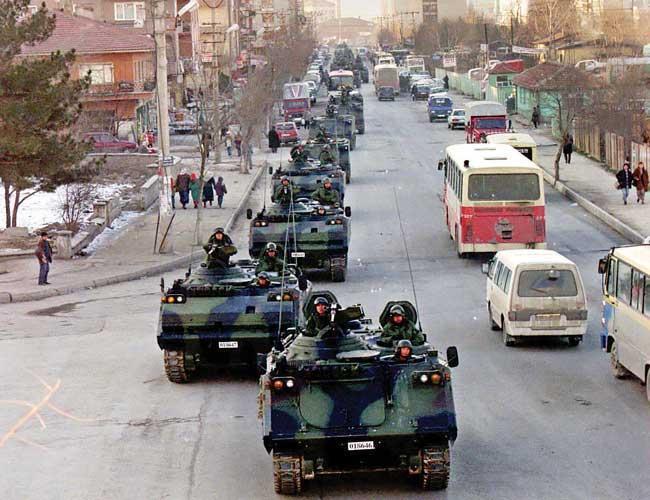
A Turkish prosecutor has recommended aggravated life sentences for a total of 60 people involved in the 1997 military memorandum, also known as the postmodern coup.
The prosecutor’s recommendations, released on Dec. 21, include General İsmail Hakkı Karadayı, 85, who served as chief of the general staff between 1994 and 1998, and retired deputy chief of the general staff General Çevik Bir.
Their charges, which concern the “Feb. 28” case, comprise “forming criminal associations to overthrow the government of the Republic of Turkey.”
Some 103 suspects were initially earmarked in the trial’s 1,300-page indictment, though the prosecutor has requested the acquittal of 39 defendants, Anadolu Agency reported. The next hearing has been adjourned to January 8.
The case tackles the infamous military intervention of Feb. 28, 1997, often described as a “postmodern coup,” which did not result in direct military rule but forced late ex-Prime Minister Necmettin Erbakan to resign after the National Security Council (MGK) issued a memorandum, commonly referred to as the 1997 military memorandum.
The memorandum relayed decisions reached by Turkish military leaders at a MGK meeting on Feb. 28, 1997, which initiated the Feb. 28 process that precipitated the resignation of former Prime Minister Erbakan from the Welfare Party, ending his coalition government.
The bloodless “postmodern” coup is famous for having deposed Turkey’s first Islamist head of government after tanks paraded outside Ankara and Erbakan was given an ultimatum.
Because the Erbakan-led government was forced out without the dissolution of parliament or the suspension of the constitution, the event was labeled a “postmodern coup” by members of the military involved in the process.
Erbakan, an Islamist politician who led the coalition government, was forced to sign into law the army’s decisions on certain issues, such as a ban on headscarves for public service officials and the shutting down of Quranic schools. The military also ramped up pressure on Necmettin Erbakan and his conservative Welfare Party over “secular concerns.”
Erbakan resigned four months later, while his Welfare Party and its successor the Virtue Party were both banned by the Constitutional Court in Jan. 1998 and June 2001 respectively.
To enforce the Feb. 28 MGK decisions, General Bir founded and chaired the “Batı Çalışma Grubu” (West Study Group).
Erbakan is widely seen as current President Recep Tayyip Erdoğan’s political mentor.
In 2013, Karadayi and Bir faced charges of helping to overthrow the Turkish government by force, but were later released under judicial control. Another four defendants have died since the court case began in 2013.
The army, which traditionally saw itself as the guarantor of Turkey’s secularism, overthrew civilian administrations three times, in 1960, 1971 and 1980.